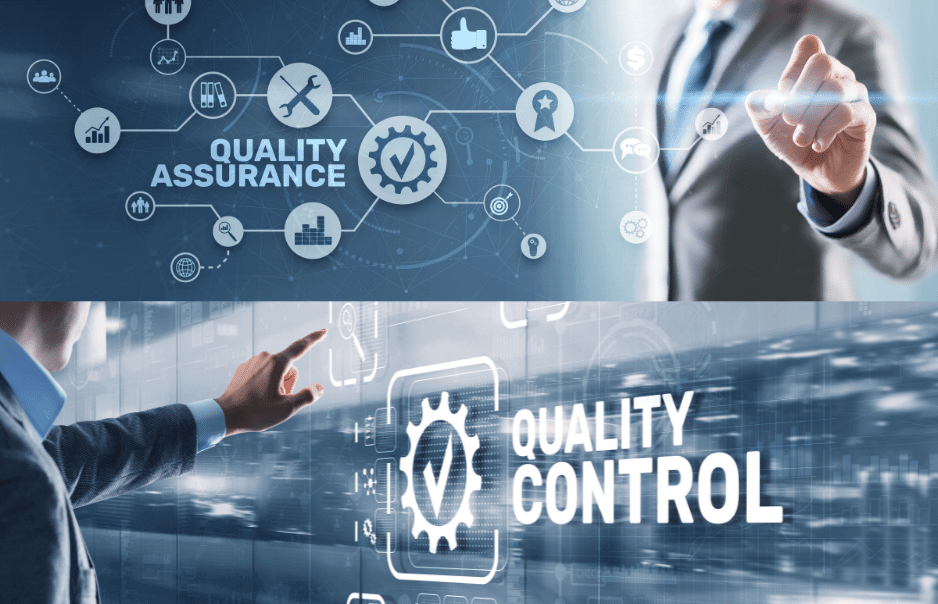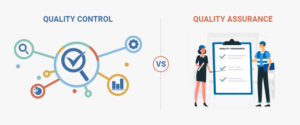

Quality Assurance and Quality Control Engineering, often referred to as QA/QC Engineering, is a pivotal discipline across various industries. It serves as the bedrock upon which products, processes, and design plans are establish to meet stringent quality standards. QA/QC engineers are entrusted with the responsibility of ensuring that excellence is not a happy accident but a deliberate outcome. In this article, we will delve into the world of QA/QC engineering and explore its significance.

Quality Assurance (QA): Building the Foundation
Quality Assurance is the cornerstone of QA/QC Engineering. QA engineers are the architects of quality within an organization. Their roles encompass:
-
Process Management
QA engineers establish and implement processes and standards that guide product development or manufacturing from inception to completion. They craft meticulous quality plans, procedures, and guidelines, ensuring every step aligns with the desired quality outcome.
-
Risk Assessment
Identifying potential risks and vulnerabilities in processes and systems is another crucial role. QA engineers meticulously analyze operations to pinpoint potential pitfalls and devise strategies to mitigate them effectively.
-
Auditing
Regular audits and inspections are the bread and butter of QA. Engineers conduct these to ensure that processes adhere to established quality standards and regulatory requirements.
-
Documentation
Documentation is a vital aspect of QA. Engineers maintain comprehensive records of quality assurance activities and findings, creating a trail of accountability and transparency.
Quality Control (QC): The Watchful Guardians
While QA sets the stage, Quality Control engineers ensure that the performance is flawless. Their responsibilities include:
-
Testing and Inspection
QC engineers are hands-on with products and materials. They conduct rigorous inspections, tests, and measurements to identify any defects, non-conformities, or deviations from quality standards.
-
Statistical Analysis
Statistical tools and techniques are employed to analyze data and monitor the quality of products or processes over time. This data-driven approach allows for proactive quality management.
-
Defect Identification
QC engineers are the frontline defenders against defects. When issues arise, they collaborate with production or development teams to rectify problems swiftly.
-
Documentation
Just like QA, QC involves meticulous documentation. Recording test results and inspection findings creates a repository of historical data, aiding in decision-making and trend analysis.
Continuous Improvement: The Heart of QA/QC
QA/QC engineers are not content with just meeting the minimum standards; they drive continuous improvement efforts within organizations. By using data and feedback, they identify areas where processes or products can be enhanced. Collaboration with cross-functional teams is key to implementing corrective and preventive actions (CAPAs) to address quality issues and prevent their recurrence.
Regulatory Compliance: Navigating the Regulatory Landscape
In regulated industries such as pharmaceuticals, aerospace, and healthcare, QA/QC engineers ensure that products and processes comply with industry-specific regulations and standards. Compliance with ISO, FDA, AS9100, and other regulatory bodies is a non-negotiable aspect of their work.
Communication and Collaboration: Building Bridges
Effective communication is the glue that holds the QA/QC process together. Engineers collaborate extensively with various teams, including design, production, and project management, to ensure that quality standards are met. Their ability to convey findings, address concerns, and facilitate corrective actions is paramount.
Conclusion
QA/QC engineering is the linchpin that ensures customer satisfaction, reduces defects and errors both in design and construction, and ultimately enhances the overall quality of products and services. It is a multidisciplinary field that demands a strong understanding of engineering principles, quality management systems, and an unwavering attention to detail. By embracing QA/QC engineering, organizations can elevate their quality standards and cement their reputation for excellence.
At Carroll Engineering Corporation, our team establishes a mast quality management plan to insure current engineering standards are maintained and continually reviewed to maintain and/or improve the professional level of service to our clients. Carroll Engineering Corporation’s business plan emphasizes its commitment to Quality Control defined as enhancing our product through review and accountability and Quality Assurance, which ensures Quality Controls occur.
